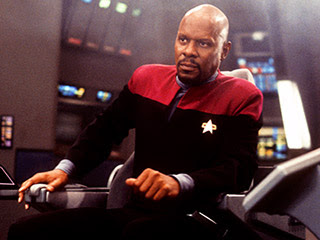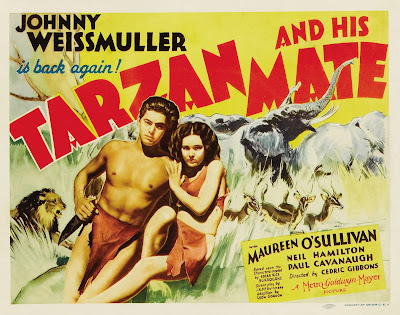I
may get a movie review wrong now and again (or even more often than that…) but
one thing I can assert which I know to be accurate: fatherhood has changed me
as a human being, and much for the better.
My
six year old son Joel has taught me a different and better brand of patience,
and more than that, he has also taught me to look at the world without jaundice
and cynicism. I often tell him about movie monsters and
other creatures of film and TV, and just by my descriptions, he can discern what
their essence is. He has compassion, in
some way, for all of them. He insists that Jason Voorhees isn’t evil…he
only loves his mother, and so forth. Joel sees those monsters in his head, and
indeed the world itself with wonder and a love of learning, and he’s managed to
make this old dog do the same thing, at least on my good days.
In terms of cult-television history, it seems like there have been fewer strong father role
models than mother role models, for some reason.
In many ways, the very concept of “father” has
changed a great deal since the era of Father Knows Best, and perhaps cult
television is still trying to countenance the shifting paradigm. Great cult-tv characters from multiple
generations such as Mr. Spock, Commander Riker, Fox Mulder, and Frank Black
contended with emotionally distant, disapproving fathers. Buffy the Vampire Slayer had, in essence, no
biological father to lean on at all.
Fortunately,
there have also been several instances in cult-tv history of really great
fathers. Uniquely, many on the list
below are fairly recent additions. My top five list come almost entirely from the 1990s and 2000s, with one
exception (from the 1970s). Since we've seen more good cult-tv Dads lately, maybe our culture is moving in the right direction...
5. Jack
Bristow (Alias)
The grim, taciturn Jack
(Victor Garber) must sit back and watch while his daughter is recruited into
the villainous organization, SD-6, which he has already infiltrated. At significant danger to himself, Jack thus
begins to help Sidney (Jennifer Garner) bring down the organization. Although he is, like the fathers I mentioned above,
emotionally cool and distant, there is no risk that Jack won’t take for his
daughter.
And indeed, by series end,
Jack is ready to lay down his life for the child who means so much to him. Jack has made many mistakes with Sidney in the past, but Jack is a role model in terms of self-effacement, and getting past mistakes. He doesn't dwell in the past; he tries to make Sidney's present the best it can be, given the circumstances. He's a good reminder as a father that we can't change yesterday. We can only make today and tomorrow better.
4. Ben
Sisko (Deep Space Nine)
I am
always enormously moved by the Ben/Jake Sisko (Avery Brooks) relationship of Star
Trek: Deep Space Nine.
It is,
for one thing, one of the few unconditionally positive father/son relationships
of the Trek franchise.
This moving relationship
reaches its zenith, for me, in the fourth season episode “The Visitor” in which Jake gives up
his entire life to try to find his missing father. Over time, Jake ages into an old man, still committed to
that impossible task, but it is one that Sisko would never have wanted for his beloved son. Jake does eventually save his father -- as
all sons save their fathers in different way -- and in a manner in keeping with
a famous quotation from Shakespeare: “When
a father gives to his son, both laugh; when a son gives to his father, both cry.”
3. Rick
Marshall (Land of the Lost).
Like
all good fathers, Rick Marshall (Spencer Milligan) teaches his children, Holly and Will, two important life-lessons: 1.) to take care of the planet, because indeed, it will be their job to
pass it on to future generations, and 2.) how to care for themselves and each
other in his absence. He knows he can't fight their battles for them, and this is a hard lesson for all fathers.
If you watch the
first two seasons of Land of the Lost (1974 – 1977), you see a Dad who gives
his children a long leash, and demonstrates to them that they can care for
themselves…and survive. Rick is confident in them and their abilities, and this makes them confident in themselves. They have the
skills, they have the moral grounding, and they have their connection to the
Marshall family to fall back on.
When Rick is ripped
away from his children in the third season, Will and Holly mourn…but they are
okay. Rick has prepared them well for
life.
In contemplating Rick Marshall and his children, I'm reminded of an old saying my
own Dad often uses: “the proof of the pudding is in the eating.”
In other words, the proof of Rick Marshall’s
great parenting rests in the people that his children grow up to become.
2. Keith
Mars (Veronica Mars)
A single
dad who raises his daughter without any help from the biological mother, Keith
Mars (Enrico Colantoni) is a father who would go to hell and back for Veronica
(Kristen Bell). In the three seasons of Veronica Mars, Keith never fails his daughter. On one occasion, he walks into fire to save her life.
On another occasion, he gives up his own dreams and desires -- to be the sheriff of Neptune -- to destroy evidence of Veronica's complicity in a crime. Keith loves his daughter unconditionally and even though it kills him, he allows her to undergo a quest "for her real father" when his biological parentage is questioned at one point.
Keith doesn't baby Veronica, either. He knows she's brilliant and dedicated, and parents her by being equally brilliant and dedicated. Certain episodes of the series pit the two investigators against each other,and it's a competition of rivals that demonstrates, above all, that Keith respects his daughter.
1. Frank
Black (Millennium)
Lance Henriksen brings a powerful
sense of quiet tenderness to his role as Frank Black, father of Jordan
(Brittany Tiplady), in Millennium.
It's a kind of silent but omnipresent sense of love that
he wordlessly offers. He's not over-the-top or schmaltzy. He's not really demonstrative. He's just
a Dad who really, really loves his child, and feels a bond with
that child. Making him a good father, Frank sees the value in children, and he sees the humor in
children too, as you can plainly see on his face in Millennium's
"Seven and One," which opens with little kids dancing (very
amusingly) at Jordan's birthday party.
Frank Black always reminds me a great
deal of my own dear Dad, and other boomer fathers I
know. Frank Black is not effusive like I am, and like other fathers of
my generation. Instead, his love is this patient, steady, yet powerful force that makes itself known not necessarily through words or a display of
overt emotionality, but through a supportive touch here or there, or a look in the
eyes.
Long story short: you always feel "safe" in
this Dad's presence. And when he decides to
open up about his feelings as a father, and a human being, the words come out
in eloquent, beautiful terms, like Frank’s speech about fatherhood in the
second season episode: “Monster.”
He says – in words all fathers can relate
to:
“When
my daughter was born it was the most important day in my life. I had a child
late-in life. She came out. She looked like... Her head was shaped like a football.
Looks like she traveled a thousand light years. Her hands were as wrinkled as a
ninety year old man's. And everyone in that room got zapped by God. They were
all jaded. Nurses and Doctors. And we were all stoned from the joy of this
experience. She remembered... And I realized that I had forgotten that I was
born. Thought I manufactured myself. And the gift she gave me was that from
that day on I could look at every man and see a child in them.”
Frank Black words to live by, this Father's Day.










John hope it is a good Father's Day. I like your analysis of these television fathers. Great choices.
ReplyDeleteSGB
Wonderful list and analysis for why you have them here, John. Well done and Happy Father's Day.
ReplyDeleteGlad to see you do an article on the dads in sci-fi. Where would you rank John Robinson from "Lost in Space" or Paul Forrester from the short-lived Starman TV show or Adama from original BSG?
ReplyDeleteAnd for worst dad, I nominate Darth Vader!
Script by the criminally overlooked writer and director, Glen Morgan (WILLARD, BLACK CHRISTMAS, THE ONE). Hollyweird doesn't give him the work and the praise he deserves.
ReplyDeleteThis breakdown was a good idea, w/astute choices and scholarship.
Happy Father's Day, JKM!
~Jordan
PS: I meant to write "Millenium" script (above).
ReplyDelete